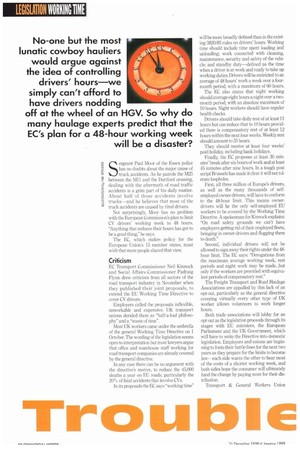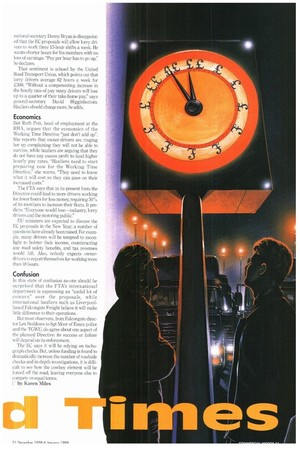No-one but the most lunatic cowboy hauliers would argue against
Page 32

Page 33

If you've noticed an error in this article please click here to report it so we can fix it.
the idea of controlling drivers' hours—we simply can't afford to have drivers nodding off at the wheel of an HGV. So why do many haulage experts predict that the EC's plan for a 48-hour working week will be a disaster?
ILLUSTRATION by NIK SPENDER
Sorgeant Paul Moor of the Essex police has no doubts about the major cause of truck accidents. As he patrols the M25 between the M11 and the Dartford crossing, dealing with the aftermath of road traffic accidents is a grim part of his daily routine. About half of those accidents involve trucks—and he believes that most of the truck accidents are caused by tired drivers.
Not surprisingly, Moor has no problem with the European Commission's plan to limit CV drivers' working week to 48 hours. "Anything that reduces their hours has got to be a good thing," he says.
The EC, which makes policy for the European Union's 15 member states, must wish that more people shared that view.
Criticism
EC Transport Commissioner Neil Kinnock and Social Affairs Commissioner Padraig Flynn drew criticism from all sectors of the road transport industry in November when they published their joint proposals, to extend the EU Working Time Directive to cover CV drivers.
Employers called the proposals inflexible, unworkable and expensive. UK transport unions derided them as "half-a-loaf philosophy" and a "waste of time".
Most UK workers came under the umbrella of the general Working Time Directive on 1 October. The wording of the legislation seems open to interpretation but most lawyers argue that office and warehouse staff working for road transport companies are already covered by the general directive.
In any case there can be no argument with the directive's motive, to reduce the 45,000 deaths a year on EU roads; particularly the 20% of fatal accidents that involve CVs.
In its proposals the EC says "working time" will be more broadly defined than in the existing 3820/85 rules on drivers' hours. Working time should include time spent loading and unloading; work connected with cleaning, maintenance, security and safety of the vehicle; and standby duty—defined as the time when a driver is at work and ready to take up working duties. Drivers will be restricted to an average of 48 hours' work a week over a fourmonth period, with a maximum of 60 hours.
The EC also states that night working should average eight hours a night over a twomonth period, with an absolute maximum of 10 hours. Night workers should have regular health checks.
Drivers should take daily rest of at least 11 hours but can reduce that to 10 hours provided there is compensatory rest of at least 12 hours within the next four weeks. Weekly rest should amount to 35 hours.
They should receive at least four weeks' paid holiday, including bank holidays.
Finally, the EC proposes at least 30 minutes' break after six hours of work and at least 45 minutes after nine hours. In a tough post script Brussels has made it clear it will not tolerate loopholes.
First, all three million of Europe's drivers, as well as the many thousands of selfemployed owner-drivers, will have to conform to the 48-hour limit. This means ownerdrivers will be the only self-employed EU workers to be covered by the Working Time Directive. A spokesman for Kinnock explains: "On road safety grounds we can't have employers getting rid of their employed fleets, bringing in owner-drivers and flogging them to death."
Second, individual drivers will not be allowed to sign away their rights under the 48hour limit. The EC says: "Derogations from the maximum average working week, rest periods and night work may be made...but only if the workers are provided with equivalent periods of compensatory rest."
The Freight Transport and Road Haulage Associations are appalled by this lack of an opt-out, particularly as the general directive covering virtually every other type of UK worker allows volunteers to work longer hours.
Both trade associations will lobby for an opt-out as the legislation proceeds through its stages with EU ministers, the European Parliament and the UK Government, which will have to write the Directive into domestic legislation. Employers and unions are beginning to form their battle-lines for the next two years as they prepare for the limits to become law—each side wants the other to bear most of the costs of a shorter working week, and both sides hope the consumer will ultimately fund the change by paying more for their distribution.
Transport & General Workers Union national secretary Danny Bryan is disappointed that the EC proposals will allow lorry drivers to work three 15-hour shifts a week. He wants shorter hours for his members with no loss of earnings. "Pay per hour has to go up," he declares.
That sentiment is echoed by the United Road Transport Union, which points out that lorry drivers average 62 hours a week for .000. "Without a compensating increase in the hourly rate of pay many drivers will lose up to a quarter of their take-home pay," says general-secretary David Higginbottom. Hauliers should charge more, he adds.
Economics But Ruth Pott, head of employment at th( RHA, argues that the economics of the Working Time Directive "just don't add up". She reports that owner-drivers are ringing her up complaining they will not be able to survive, while hauliers are arguing that they do not have any excess profit to fund higher hourly pay rates. "Hauliers need to start preparing now for the Working Time Directive," she warns. "They need to know what it will cost so they can pass on their increased costs."
The ['TA says that in its present form the Directive could lead to more drivers working for fewer hours for less money, requiring 50% of its members to increase their fleets. It predicts: "Everyone would lose—industry, lorry drivers and the motoring public."
EU ministers are expected to discuss the EC proposals in the New Year; a number of questions have already been raised. For example, many drivers will be tempted to moonlight to bolster their income, couriteracting any road safety benefits, and tax revenues would fall. Also, nobody expects ownerdrivers to report themselves for working more than 48 hours.
Confusion
hi this state of confusion no-one should be surprised that the 1-."I'A's international department is expressing an "awful lot of concern" over the proposals, while international hauliers such as Liverpoolbased Falcongate Freight believe it will make little difference to their operations.
But most observers, from Falcongate director Len Beddows to Sgt Moor of Essex police and the TGWU, do agree about one aspect of the planned Directive: its success or failure will depend on its enforcement.
The EC says it will be relying on tachograph checks. But, unless funding is found to dramatically increase the number of roadside checks and in-depth investigations, it is difficult to see how the cowboy element will be forced off the road, leaving everyone else to compete on equal terms.
by Karen Miles
































































































